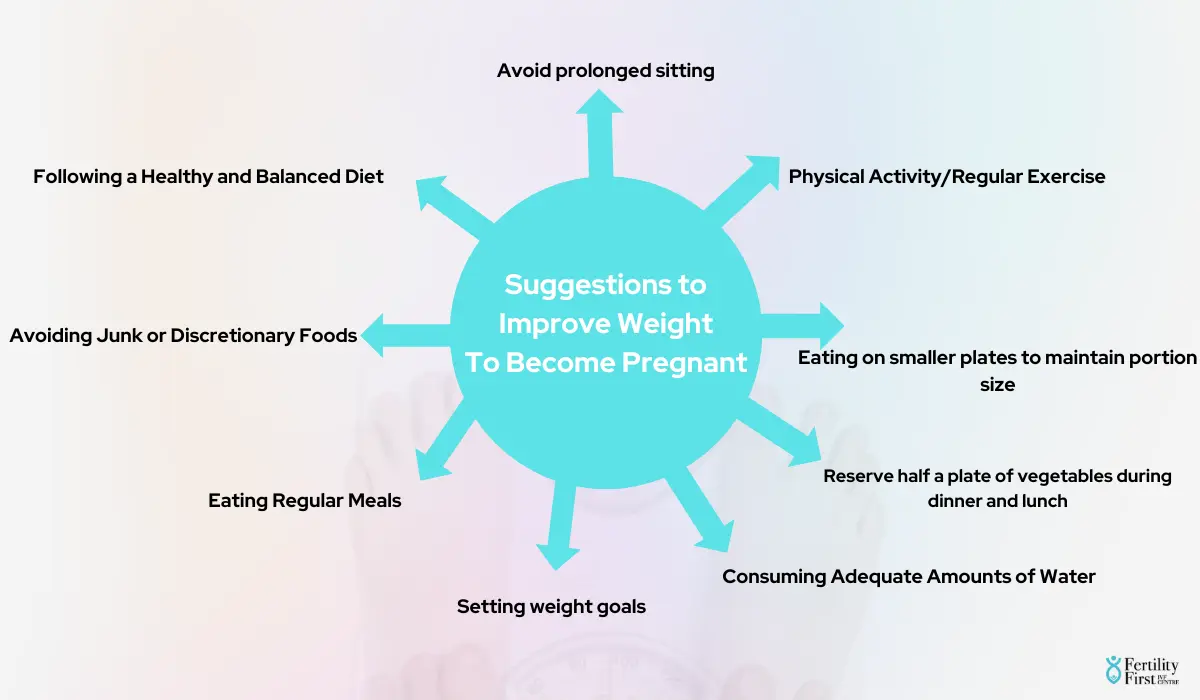Minimum Weight To Get Pregnant (Experts Guide)

Weight plays a decisive role in improving the chances of conception in a woman. This very fact has instilled the need to understand how it correlates with the likelihood of pregnancy. On this note, the current article seeks to provide a brief explanation of what is considered to be the normal (or the minimum) weight to get pregnant with the need to consider any weight loss strategies that will prove purposeful, both from an individual and general point of view.
What Role Does Normal Weight Play in Getting Pregnant?
One could undoubtedly state that a woman within a healthy weight range has a much higher likelihood of becoming pregnant compared to those who are either above or below that specific range. It would be worth noting, however, that there does not exist an ideal weight range because, for the most part, it is the body mass index (BMI) of an individual that truly decides the possibility of becoming pregnant. After stating so, we consider a BMI between 18.5 and 24.9 appropriate for the stated purpose.
Simultaneously, we categorize a BMI between 25 and 29 as overweight, while a BMI over 30 qualifies as obese. You can accurately determine whether you have an ideal weight, are overweight, or are obese using the BMI tool.
Further understanding the role of weight in getting pregnant has prompted the need to address another crucial question: “Why is maintaining a healthy weight important for getting pregnant?” The answer to this question is primarily grounded in the knowledge that having a normal weight requires considering both height and weight. Of note, this can be best judged by the BMI tool. Another statement that could provide a definitive answer is the fact that obesity causes polycystic ovarian disease, which, in turn, serves as the primary cause of low fertility in women. When we consider being underweight, i.e., having a BMI below 18.5, it also impacts a woman’s likelihood of becoming pregnant, as the situation parallels what we observe in an overweight woman.
Also Read: Signs Of High Fertility In A Women
What is the Minimum Weight To Become Pregnant?
Since there is no definitive weight that would account for the minimum weight to conceive, a BMI of between 18.5 and 24.9 would serve as the best normal range for the purpose. This is because both below and above this have been considered underweight and overweight/obese respectively.
Importance of Diet and Exercise in Maintaining Proper Weight To Get Pregnant
Doubtlessly, diet and exercise are those essential ingredients that enhance the possibility for a woman to conceive by helping her to reduce the extra weight gained through the years. Thus, eating a healthy diet rich in all the essential nutrients and micronutrients are critical to stay fit and stay in shape. Of note, the benefits are many when these concern with having a normal weight because there is an increased likelihood for a woman to deliver a healthy baby.
Suggestions to Improve Weight To Become Pregnant
There exist innumerable suggestions for acquiring normal weight to improve the chances of conception. So far, these have included:

Following a Healthy and Balanced Diet
This necessitates an individual, i.e., a prospective mother-to-be, to consider intaking from major food groups, such as vegetables and legumes, fruits, wholegrain bread and cereals, dairy products (milk, yogurt, cheese or alternative), lean meat/poultry, fish, and eggs, and nuts and seeds.
Avoiding Junk or Discretionary Foods
Chips, biscuits, fatty meats (red meat), pastries, cakes, fast food, and confectionary belong to this group.
Eating Regular Meals
Women deciding to maintain an adequate weight to become pregnant should consume regular meals at the given time of the day. Skipping meals is not going to provide any fruitful results with consequences kept in view.
Consuming Adequate Amounts of Water
It is always safe to drink plenty of water, preferably 8 to 10, throughout the day than having gulps of sugary drinks once a day.
Reserve half a plate of vegetables during dinner and lunch
Vegetables are rich in essential nutrients and micronutrients and cause no harm other than preparing one’s body for fertility and ensuing pregnancy by assisting it to maintain a healthy weight in the process.
Eating on smaller plates to maintain portion size
Controlling portion size is critical to maintaining adequate weight to become pregnant.
Physical Activity/Regular Exercise
Getting to move and exercising routinely, though tedious for some, is a sure-shot method or plan to stay within the normal BMI range to enhance the chances of conception.
Avoid prolonged sitting
Getting up regularly from sitting positions when working on a laptop or computer will help prevent excess fat build-up in the waist and hips. Of note, this is what impacts fertility rates in women.
Setting weight goals
Making realistic weight loss goals, those that will help motivate a woman to stay in a normal weight range will also prompt her to stay as active as possible to prevent becoming overweight or obese.
Conclusion
The current article has attempted to illustrate the importance of maintaining an appropriate weight range to improve the chances of becoming pregnant. It has also conveyed the significance of utilizing the BMI tool and BMI to determine whether one is normal weight, overweight, or obese. Going forward, the article has also communicated how being underweight or obese/overweight affects the chances of fertility by referring to the BMI tool again and has, ultimately suggested plans to stay healthy and fit to improve the likelihood of conception.
